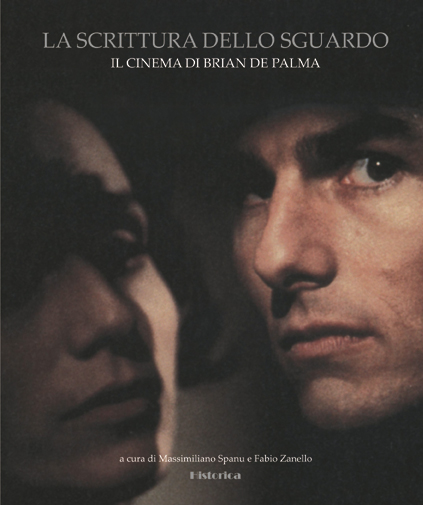"THE WRITING OF THE GAZE: THE CINEMA OF BRIAN DE PALMA"
 At the Venice Film Festival today, Historica Edizioni previewed the inaugural volume in its new series of books on cinema. The book is called The Writing Of The Gaze: The Cinema Of Brian De Palma, and it was unveiled today at the Info Point in front of the Venice Film Festival in the Movie Village. The Writing Of The Gaze is edited by Massimiliano Spanu and Fabio Zanello, who were each scheduled to be on hand at the Info Point today to take part in a video interview for Giuseppe Amodio and Deborah Farina's Italian program Venezia Pulp. Last January, Lankelot's Francesco Giubilei interviewed Zanello, asking him why they chose De Palma as the initial subject for the series, to be followed by a volume on Francis Ford Coppola. Zanello responded:
At the Venice Film Festival today, Historica Edizioni previewed the inaugural volume in its new series of books on cinema. The book is called The Writing Of The Gaze: The Cinema Of Brian De Palma, and it was unveiled today at the Info Point in front of the Venice Film Festival in the Movie Village. The Writing Of The Gaze is edited by Massimiliano Spanu and Fabio Zanello, who were each scheduled to be on hand at the Info Point today to take part in a video interview for Giuseppe Amodio and Deborah Farina's Italian program Venezia Pulp. Last January, Lankelot's Francesco Giubilei interviewed Zanello, asking him why they chose De Palma as the initial subject for the series, to be followed by a volume on Francis Ford Coppola. Zanello responded:Yes, the title of this inaugural volume of the Historica Editions planned for April will be "The Writing of the Gaze. The Cinema of Brian De Palma." That one is being taken care of between myself and Professor Massimiliano Spanu at the University of Trieste. Spanu and I have assigned the essays that will make up the volume to a very competent working team: Leonardo Gandini, Massimo Causo, Edvige Liotta, Domenico Monetti, Elisa Grando, M.Deborah Farina, Andrea Fontana, Mario Gerosa, Carlo Griseri, Diego Mondella, Alessandra Montesanto, Davide Taro, Michele Raga, Michele Tosolini, Mario Molinari, Enrico Terrone, Luca Bandirali, Andrea Fontana, Piero Babudro, Fabio Migneco and Corrado Denaro.
The choice fell on Brian De Palma, because, besides being a leading exponent of the new Hollywood, from the outset he has pursued a continuous research and reflection on the image and forms of narrative genres, far from being exhausted themselves. He is a real investigator who has represented and continues to represent a model of artistic coherence, even when dealing with commercial films. Aware that we will not be neither the first nor the last to study the auteur of "Scarface," "Carlito's Way" and "Carrie" Spanu and I think that De Palma as a director is always "forward" and "young." So, because of this, there will never be enough written about him in subsequent years, I'm sure.
WONDERS WHY "MASTERPIECE" LIKE REDACTED WAS NEVER RELEASED IN ITALY, DESPITE WINNING AT VENICE
I moreover confess that I’d like to stir the consciences of those who have not distributed into the country a masterpiece like "Redacted" that, after winning the Venice Film Festival, was visible only on satellite TV. We'll see!
Asked why they chose Coppola for the second volume, Zanello replied:
Some of the adjectives that I spent on De Palma may also be applied to Francis Ford Coppola. As a notation I would add: bold and reckless. Only he could sign a formal masterpiece of elegance such as "Dracula", after the many film versions of the myth, and producers who taunted him for his idea to bring Bram Stoker’s creature to the screen, before the proliferation of vampire movies in recent years. Other movies like "The Conversation" and "One from the Heart" have foreshadowed issues such as wire tapping and high definition. Today everybody worships these films as they rightly deserve, yet at the time they were notorious flops at the box office. Coppola, therefore, provides another congenital ground on which to develop a 360-degree analysis.
ESSAY SEEKS TO "REHABILITATE" DE PALMA'S MISSION: IMPOSSIBLE
Carlo Griseri posted on his blog today that he had the "privilege/burden" of writing the essay on Mission: Impossible, an image from which graces the sublime cover to The Writing Of The Gaze. Griseri's essay attempts to "rehabilitate" De Palma's film which, according to Griseri, is unanimously considered one of De Palma's minor works, and is "discreetly snubbed by purists and critics." All this despite French critic Luc Lagier's book-length study on De Palma's Mission: Impossible.



